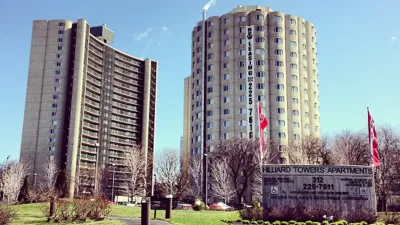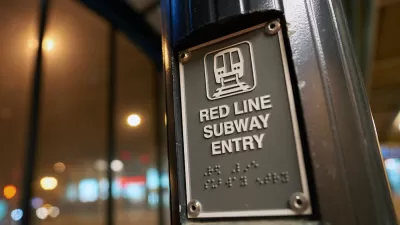The Hilliard Homes avoided the wrecking ball for 50 years, even while other high-rise projects were knocked down. A Chicago Reader pierce suggests the design and management of these buildings could make them a model for future High-rise projects.

High-rise projects have a bad reputation and, in Chicago, two thirds of them have been torn down. The Hilliard Homes near Chinatown have not, and as Maya Dukmasova of the Chicago Reader reports there's good reason for that. For a start, the buildings were designed by renowned architect, Bertrand Goldberg, who gave the buildings his "Signature bulbous, organic shapes, reminiscent of corncobs or honeycombs." He was, after all, the man who had designed Marina City, iconic buildings which are home to some of Chicago's wealthiest residents.
Projects like the Hilliard Homes, despite their pedigree, have come down around the country, and this project may have suffered the same fate if it hadn’t had a famous name attached to it. "Less than a decade after Hilliard opened, America began to embrace the idea that high-rise public housing doesn't work." And, while many who lived in the apartments in the 70s compared it favorably to other projects around the city, in the 80s the building was in need of serious maintenance, which the Chicago Housing Authority determined it could not provide. Eventually the buildings were sold to Peter Holsten.
Many are proud of the transition the building made. "The development contains a concentration of low-income residents living in high-rise buildings (in subsidized units). Though this has come to be seen as a recipe for disaster in housing policy circles, a stroll through Hilliard today makes it seem like a utopia." Dukmasova reports that this is not achieved by architecture alone, but through careful management including over 100 million dollars in improvements that were put into the building when it was purchased, and sometimes controversial rules around behavior in the building and background checks for perspective tenants. Holsten the current owner of the Hilliard Homes, says he will tell troublesome young people who fight or cause trouble on the property. "If this keeps going on, your mother is at risk of losing her apartment. Is that what you want?" Holsten believes that the consistent and fair deployment of these rules are a big part of what makes the development successful.
FULL STORY: The Goldberg variation: High-rise public housing that works

Alabama: Trump Terminates Settlements for Black Communities Harmed By Raw Sewage
Trump deemed the landmark civil rights agreement “illegal DEI and environmental justice policy.”

Planetizen Federal Action Tracker
A weekly monitor of how Trump’s orders and actions are impacting planners and planning in America.

Why Should We Subsidize Public Transportation?
Many public transit agencies face financial stress due to rising costs, declining fare revenue, and declining subsidies. Transit advocates must provide a strong business case for increasing public transit funding.

Understanding Road Diets
An explainer from Momentum highlights the advantages of reducing vehicle lanes in favor of more bike, transit, and pedestrian infrastructure.

New California Law Regulates Warehouse Pollution
A new law tightens building and emissions regulations for large distribution warehouses to mitigate air pollution and traffic in surrounding communities.

Phoenix Announces Opening Date for Light Rail Extension
The South Central extension will connect South Phoenix to downtown and other major hubs starting on June 7.
Urban Design for Planners 1: Software Tools
This six-course series explores essential urban design concepts using open source software and equips planners with the tools they need to participate fully in the urban design process.
Planning for Universal Design
Learn the tools for implementing Universal Design in planning regulations.
Caltrans
Smith Gee Studio
Institute for Housing and Urban Development Studies (IHS)
City of Grandview
Harvard GSD Executive Education
Toledo-Lucas County Plan Commissions
Salt Lake City
NYU Wagner Graduate School of Public Service




























